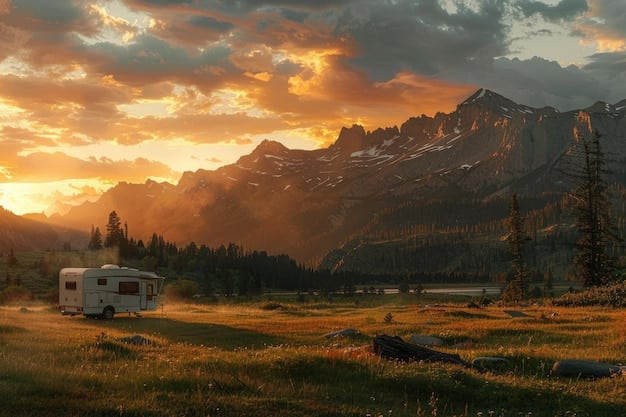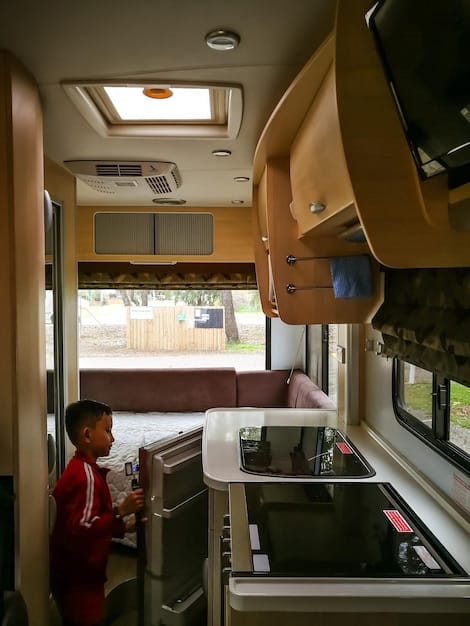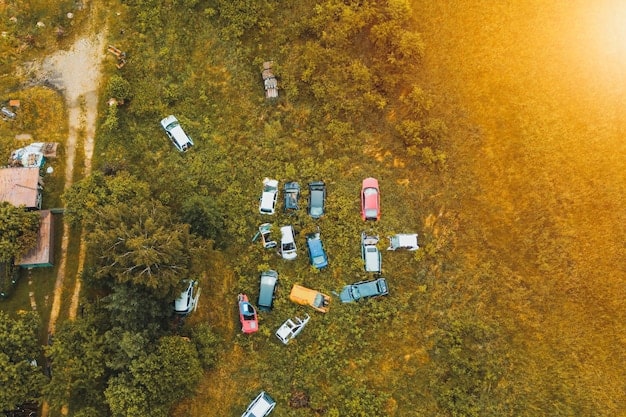RV Travel in the US: Your 2025 Beginner’s Guide

RV travel in the US offers an adventurous yet affordable way to explore the country in 2025; this beginner’s guide covers everything from renting an RV and finding campsites to saving money and planning your dream road trip on wheels.
Dreaming of hitting the open road, but not sure where to start? RV travel in the US: A Beginner’s Guide to Renting, Camping, and Saving Money in 2025 is your ticket to adventure. Let’s explore how you can make that RV dream a reality!
Planning Your RV Adventure in the US
Embarking on an RV journey across the United States requires careful planning to ensure a smooth and enjoyable experience. From choosing the right RV to mapping out your route, every detail counts.
Choosing the Right RV
Selecting the perfect RV is the first step in your adventure. Consider the size of your group, the length of your trip, and your budget when making your decision.
- Class A RVs: These are the largest and most luxurious options, ideal for long trips and large families.
- Class B RVs (Camper Vans): Compact and easy to drive, perfect for couples or solo travelers.
- Class C RVs: A balance between size and maneuverability, suitable for small families and shorter trips.
Renting an RV allows you to try out different models before committing to a purchase. Websites like RVshare and Cruise America offer a wide variety of RVs for rent, catering to different needs and budgets.

Mapping Out Your Route
Deciding where to go is a crucial part of planning your RV trip. The US offers a diverse range of landscapes and attractions, from stunning national parks to charming small towns.
- National Parks: Explore iconic destinations like Yellowstone, Yosemite, and the Grand Canyon.
- Coastal Routes: Drive along the Pacific Coast Highway or the Atlantic Coast for breathtaking ocean views.
- Historic Sites: Visit landmarks and museums to learn about American history and culture.
Use online resources like Roadtrippers and Allstays to find points of interest, campgrounds, and RV-friendly routes. Planning your route in advance helps ensure you have a stress-free and enjoyable journey.
In conclusion, careful planning is essential for a successful RV adventure in the US. By choosing the right RV and mapping out your route, you can create unforgettable memories on the road.
Renting an RV: What You Need to Know
Renting an RV is an excellent way to experience the RV lifestyle without the commitment of ownership. It opens up a world of travel possibilities, but it’s important to understand the rental process and what to expect.
Understanding Rental Agreements
Before signing a rental agreement, carefully review the terms and conditions. Pay attention to mileage limits, insurance coverage, and cancellation policies.
- Mileage Limits: Know how many miles are included in the rental and what the overage fees are.
- Insurance Coverage: Ensure you have adequate insurance coverage to protect against accidents and damages.
- Cancellation Policies: Understand the penalties for canceling or changing your reservation.
Many rental companies offer additional services like roadside assistance and equipment rentals. Consider these options to enhance your travel experience.
Tips for Saving Money on RV Rentals
Renting an RV can be expensive, but there are several ways to save money. Booking in advance, traveling during the off-season, and comparing prices from different rental companies can help you get the best deal.
Look for discounts and promotions offered by rental companies. Some companies offer discounts for AAA members, military personnel, or seniors.
Consider renting for a longer period. Many rental companies offer discounts for rentals of a week or more.
In summary, renting an RV requires careful planning and attention to detail. By understanding rental agreements and following these tips, you can save money and enjoy a memorable road trip.
Finding the Best RV Campgrounds
Finding the right campground is crucial for a comfortable and enjoyable RV experience. With so many options available, it’s important to know what to look for and how to make reservations.
Types of RV Campgrounds
RV campgrounds vary in terms of amenities, services, and scenery. Understanding the different types of campgrounds can help you choose the one that best suits your needs.
- Private Campgrounds: These campgrounds offer a range of amenities, including full hookups, swimming pools, and recreational facilities.
- Public Campgrounds: Located in national and state parks, these campgrounds offer a more rustic experience with fewer amenities.
- Boondocking (Dry Camping): This involves camping without hookups in remote areas, offering a more adventurous and secluded experience.
Websites like Campground Reviews and Recreation.gov provide valuable information about campgrounds, including user reviews, photos, and reservation details.
Making Reservations and Planning Ahead
Many popular campgrounds require reservations, especially during peak season. Booking in advance is essential to secure your spot and avoid disappointment.
When making reservations, consider the size of your RV and the type of hookups you need. Full hookups include water, electric, and sewer connections, while partial hookups may only offer some of these amenities.

Read reviews and check photos of the campground before making your reservation. This can help you get a better sense of the campground’s atmosphere and amenities.
In conclusion, finding the best RV campground requires careful planning and research. By understanding the different types of campgrounds and making reservations in advance, you can ensure a comfortable and enjoyable camping experience.
Essential Gear and Supplies for RV Travel
Having the right gear and supplies is essential for a safe and comfortable RV trip. Making a checklist and packing efficiently can help you avoid unnecessary stress and ensure you have everything you need.
Safety and Maintenance Essentials
Safety should be your top priority when traveling in an RV. Equip your RV with essential safety items like a fire extinguisher, first aid kit, and carbon monoxide detector.
Carry basic maintenance tools and supplies to handle minor repairs on the road. This may include a wrench, screwdriver, duct tape, and spare fuses.
Learn how to perform basic maintenance tasks, such as checking tire pressure, changing a flat tire, and troubleshooting common RV problems.
Comfort and Convenience Items
Pack items that will make your RV feel like home. Comfortable bedding, cooking utensils, and entertainment options can enhance your travel experience.
- Kitchen Supplies: Bring pots, pans, dishes, and utensils for cooking meals in your RV.
- Bedding and Linens: Pack comfortable bedding, pillows, and blankets for a good night’s sleep.
- Entertainment: Bring books, games, and electronic devices to keep yourself entertained during downtime.
Consider bringing outdoor gear like camping chairs, a folding table, and a portable grill for enjoying the outdoors.
In summary, packing the right gear and supplies is essential for a safe and comfortable RV trip. By prioritizing safety and comfort, you can enjoy a relaxing and memorable adventure on the road.
Saving Money on RV Travel: Tips and Tricks
RV travel can be an affordable way to see the country, but it’s important to budget wisely and look for ways to save money. By following these tips and tricks, you can stretch your travel budget and enjoy more adventures.
Budgeting for Your RV Trip
Create a detailed budget that includes all your anticipated expenses, such as rental fees, fuel costs, campground fees, and food expenses.
Track your spending throughout your trip and adjust your budget as needed. Use mobile apps and spreadsheets to stay organized and monitor your expenses.
Reducing Fuel Costs
Fuel is one of the biggest expenses for RV travel. By driving efficiently and planning your route carefully, you can reduce your fuel consumption and save money.
- Drive at a moderate speed: Driving at a slower speed can improve your fuel efficiency.
- Avoid unnecessary idling: Turn off the engine when stopped for more than a few minutes.
- Plan your route: Choose routes that avoid steep hills and congested areas.
Consider joining a fuel rewards program to earn discounts on gasoline and diesel.
In conclusion, saving money on RV travel requires careful planning and budgeting. By following these tips and tricks, you can reduce your expenses and enjoy a more affordable adventure on the road.
Staying Safe on the Road: RV Travel Safety Tips
Safety should be a top priority when traveling in an RV. By following these safety tips, you can minimize risks and enjoy a secure and worry-free journey.
Pre-Trip Safety Checklist
Before hitting the road, conduct a thorough inspection of your RV to ensure it’s in good working condition. Check the tires, brakes, lights, and fluid levels.
Secure all loose items inside the RV to prevent them from shifting during travel. This includes dishes, appliances, and personal belongings.
Driving Safety
Practice defensive driving techniques and stay alert while on the road. Be aware of your surroundings and anticipate potential hazards.
- Avoid distractions: Put away your cell phone and focus on driving.
- Take breaks: Stop every few hours to rest and stretch your legs.
- Be aware of weather conditions: Check the forecast and adjust your plans accordingly.
Familiarize yourself with the RV’s handling characteristics and practice maneuvering in different conditions. This can help you avoid accidents and stay in control.
In summary, staying safe on the road requires careful planning and preparation. By following these safety tips, you can minimize risks and enjoy a secure and worry-free RV adventure.
RV Travel in 2025: What to Expect
As we look ahead to 2025, RV travel in the US is expected to continue growing in popularity. Understanding the trends and what to expect can help you plan your trip more effectively.
Technological Advancements in RVs
RVs are becoming more technologically advanced, with features like smart home integration, advanced navigation systems, and energy-efficient appliances. These advancements can enhance your comfort and convenience on the road.
Increased Demand for Campgrounds
With the growing popularity of RV travel, demand for campgrounds is expected to increase. Booking reservations in advance will become even more crucial to secure your spot.
Consider exploring alternative camping options, such as boondocking and dispersed camping, to avoid crowded campgrounds.
Sustainability in RV Travel
There’s a growing emphasis on sustainability in RV travel, with more travelers seeking eco-friendly options. Consider using solar panels, conserving water, and properly disposing of waste to minimize your environmental impact.
In conclusion, RV travel in 2025 is poised to be more advanced, more popular, and more sustainable. By staying informed and adapting to these trends, you can enjoy a fulfilling and responsible RV adventure.
| Key Point | Brief Description |
|---|---|
| 🚐 RV Selection | Choose the right RV based on group size, trip length, and budget. |
| 🗺️ Route Planning | Map out your route in advance using online resources for campgrounds and attractions. |
| 💰 Saving Money | Book in advance, travel during the off-season, and reduce fuel consumption. |
| 🔒 Safety Tips | Inspect your RV before each trip and practice defensive driving techniques. |
Frequently Asked Questions
▼
Class C RVs are generally recommended for beginners due to their manageable size and ease of driving. They offer a good balance of space and maneuverability, making them suitable for small families and shorter trips.
▼
It’s best to book your RV rental several months in advance, particularly if you plan to travel during peak season. This will give you the best selection of RVs and ensure you get the best price.
▼
Essential items include safety gear (fire extinguisher, first aid kit), kitchen supplies, comfortable bedding, basic maintenance tools, and entertainment options. Don’t forget personal items and clothing appropriate for the climate.
▼
Consider public campgrounds in national and state parks, which often offer lower rates than private campgrounds. Boondocking (dry camping) can also save money on campground fees, but requires more preparation.
▼
Always perform a pre-trip inspection, secure loose items, avoid distractions, take frequent breaks, and be aware of weather conditions. Practice defensive driving and familiarize yourself with the RV’s handling characteristics.
Conclusion
With careful planning, a bit of research, and these helpful tips, your RV travel in the US: A Beginner’s Guide to Renting, Camping, and Saving Money in 2025 can be an unforgettable adventure. Embrace the open road and create memories that will last a lifetime!





